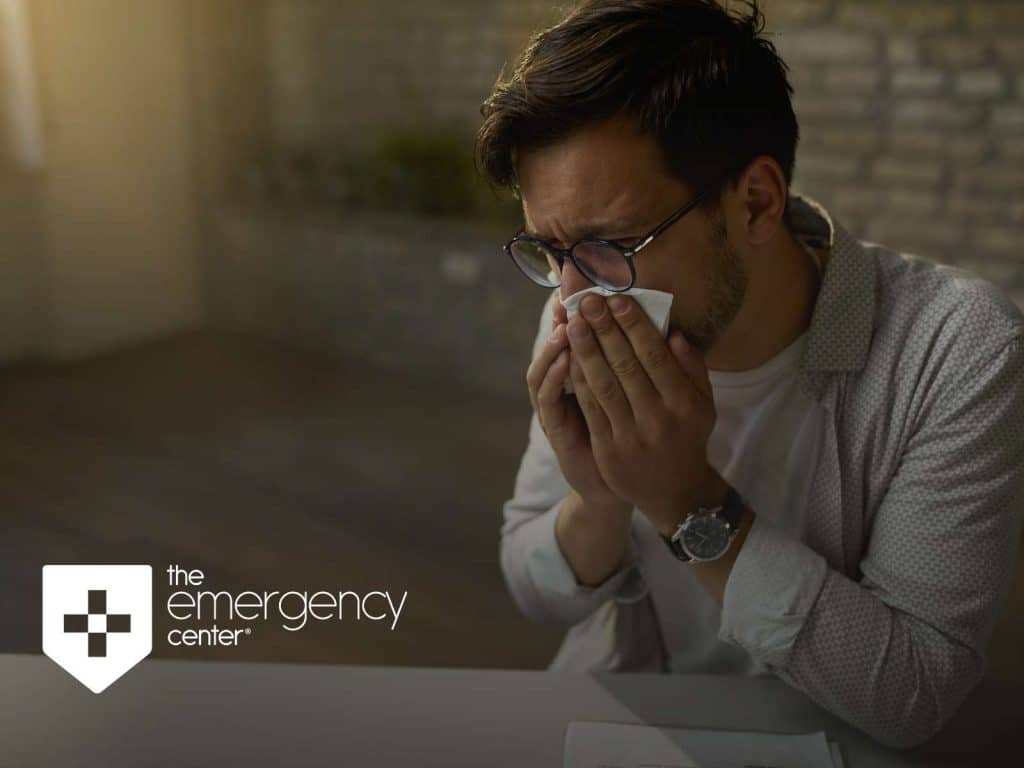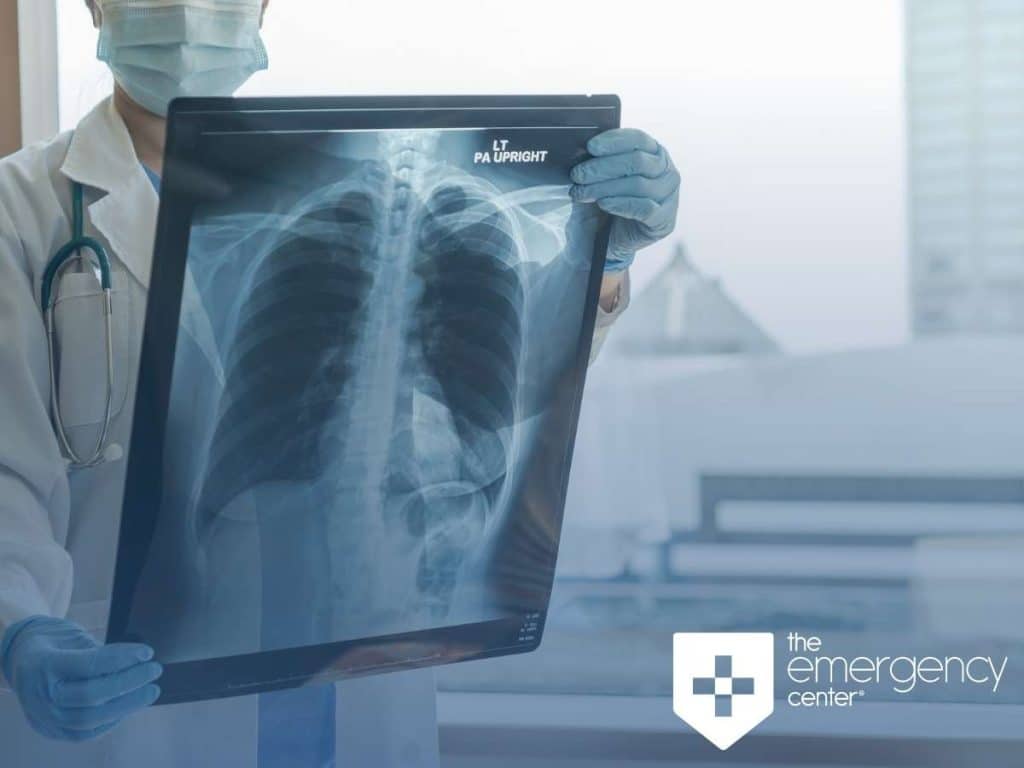Respiratory Problems
Acute Respiratory Problems Require Immediate Emergency Care
Acute respiratory problems associated with asthma, bronchitis and pneumonia require immediate emergency care. If respiratory problems such as these are left untreated, they could result in respiratory failure (loss of consciousness or death).
According to the National Heart, Lung, and Blood Institute, respiratory failure is defined as a condition in which not enough oxygen passes through your lungs into your blood. Your body’s organs, such as your heart and brain, need oxygen-rich blood to work well. The outlook for respiratory failure depends on the severity of its underlying cause, how quickly treatment begins, and your overall health.

Asthma
Asthma is an inflammatory disorder of the airways that makes breathing difficult. The inflammation of the air passages causes the airways to narrow temporarily, restricting oxygen to the lungs. This results in asthma symptoms, including:
-
Wheezing
-
Shortness of breath
-
Chest Tightness
-
Coughing
During an attack, asthma symptoms worsen due to bronchospasms (tightening of the muscles around the airways), swollen or inflamed airways, and thicker mucus production. Since asthma is a chronic condition, patients learn to manage their symptoms using asthma inhalers and other asthma medications to prevent further breathing problems. For mild attacks, airways open up within a few minutes to hours after treatment.
What are the Symptoms of a Severe Asthma Attack?
Occasionally, an asthma attack – or a severe flare-up of asthma symptoms that does not respond to everyday treatments – may occur. If you are requiring extra doses of your inhaler, seek immediate evaluation. Waiting too long may lead to respiratory failure. Symptoms of a more severe asthma attack include:
-
Severe wheezing when breathing in and out
-
Constant coughing
-
Very rapid breathing
-
Tightness or pressure in chest
-
Tightened neck and chest muscles (retractions)
-
Breathlessness
-
Difficulty talking, eating or sleeping
-
Pale, sweaty face
-
Blue lips or fingernails
What Should you Do When Someone has a Severe Asthma Attack?
Severe asthma attacks require immediate emergency care as the severity of an attack can escalate rapidly. To help someone who is having a severe asthma attack, try and assess the severity of the attack, as it will dictate how you respond.
-
Breathing Difficulty + Cannot Speak At All: Call 911
-
Breathing Difficulty + Can Speak a Few Words: Find Inhaler and Have Patient Use It; Drive Patient to Closest Emergency Room for Treatment
-
Breathing Difficulty + Can Speak a Few Words + No Inhaler Available: Calm the Patient (anxiety can worsen symptoms) and Drive Patient to Closest Emergency Room for Treatment
For severe asthma attacks, an inhaler alone is not sufficient treatment. These severe attacks require prompt medical attention and more aggressive treatment.

Bronchitis
Bronchitis is an inflammation of the bronchial tubes (the airways that allow air to pass from the mouth to the lungs). Symptoms of bronchitis include:
-
Cough
-
Productive cough (with either clear, yellow or greenish sputum)
-
Fatigue
-
Nasal congestion
-
Chest discomfort
-
Slight fever
-
Chills
Because these symptoms often mimic the common cold, people don’t realize they have bronchitis until they have a productive cough with yellow or brown sputum or when the coughing begins to create great chest discomfort. Unlike the common cold, bronchitis symptoms may linger for up to 3 weeks. Antibiotics are usually not prescribed, especially if the infection is viral in nature. The best treatment is bed rest and over-the- counter preparations to reduce cough symptoms.
What are the Symptoms for Severe Bronchitis?
The symptoms for a severe case of bronchitis include:
-
Fever of 100.4 degrees Fahrenheit for more than a few days
-
Cough that persists for more than 3 weeks
-
Cough that produces blood or mucus
-
Cough causes wheezing or shortness of breath
What Should you do when someone has Severe Bronchitis?
If you are experiencing severe bronchitis symptoms, you should seek emergency care. Don’t ignore these symptoms. The doctor will want to see you to rule out pneumonia or asthma.
Pneumonia
Pneumonia is an infection (bacterial, viral or fungal) in one or both lungs. It causes inflammation in the air sacs (alveoli) in your lungs. The alveoli fill with fluid or pus, making it difficult to breath. Some cases of bacterial pneumonia, often called walking pneumonia, are mild and symptoms are similar to the common cold, including:
-
Low grade fever
-
Shortness of breath
-
Fatigue or tiredness
-
Chest pain that gets worse when you take a deep breath or cough
-
Loss of appetite
These milder cases may require evaluation and care from your primary care doctor, who may prescribe an antibiotic and bed rest for up to 7 days.
What are the Symptoms for Severe Cases of Pneumonia?
Young children, seniors, and individuals with compromised immune systems are at a higher risk of developing more life-threatening cases of pneumonia. Symptoms include:
-
Steady fever of 102 degrees Fahrenheit or higher
-
Chest Pain
-
Difficulty Breathing
-
Persistent or Severe Coughing
What Should you do when someone has a Severe Case of Pneumonia?
Be sure to seek emergency care if you have a severe case of pneumonia. Your treatment may include IV fluids and antibiotics, oxygen therapy or breathing treatments. Since acute respiratory failure can be a medical emergency, don’t delay getting emergency treatment.
FAQs About Respiratory Problems
Can respiratory infections lead to long-term damage if not treated properly?
Yes, untreated respiratory infections, such as pneumonia or bronchitis, can lead to long-term damage. If left untreated, these infections can cause scarring in the lungs, reduce lung function, and increase the risk of chronic respiratory conditions like COPD. Prompt treatment is crucial to prevent complications and preserve lung health.
What are some warning signs that I’m developing respiratory problems?
Some warning signs of developing respiratory problems include shortness of breath, persistent cough, wheezing, chest tightness, and difficulty breathing, especially during physical activities. Other symptoms may include fatigue, coughing up blood, or a change in the color of mucus. If you experience any of these symptoms, it’s important to seek medical attention.
How can I differentiate between a mild respiratory issue and a serious condition?
Mild respiratory illnesses typically have symptoms like a mild cough, runny nose, or mild shortness of breath that improve with rest or over-the-counter medication. Severe illnesses can involve difficulty breathing, rapid or labored breathing, persistent chest pain or pressure, blue lips or face, confusion, or inability to speak in complete sentences. If they rapidly worsen or do not improve in a day or two, or if you notice any sign of distress, it is important to call emergency services immediately.
Can respiratory problems be caused or worsened by allergies?
Yes, allergies can cause or worsen respiratory conditions. Allergens like pollen, dust mites, mold, pet dander, and certain chemicals can cause airway inflammation, leading to coughing, wheezing, nasal congestion, and breathlessness. In individuals with asthma or allergic rhinitis, exposure to allergens can aggravate symptoms or cause full-blown attacks. Avoidance strategies and appropriate medications for managing allergies can avert respiratory complications.
What diagnostic tests are commonly performed for respiratory problems in the ER?
In the ER, routine tests for respiratory disease include pulse oximetry to check the oxygen level, chest X-rays to screen for infection or lung abnormality, blood tests to check for oxygen and infection, and in certain instances, an ECG to rule out heart disease. Depending on the symptoms, doctors may also use lung function tests, extended observation stay, or CT scans for closer monitoring.
What Our Patients are Saying About Us
My visit to the emergency center of San Antonio was amazing. I was seen right away for sciatica pain. Dr. Styskal was amazing. I was treated right away and sent home with my medication. I wish more facilities would practice this without you having to make an additional stop at a pharmacy for medication. I know five stars is the highest I can give but they deserve 100+ stars.
Lizette M. ★★★★★
I was skeptical about going to the Emergency room, because for me ER’s have a bad reputation. My experience here was one of the best experience I’ve ever had. Keith at the front desk was very nice and went above and beyond for me. I forget my insurance card and wanted to know how much my co pay would be. He looked me up with no issue, brought my a wheelchair to ease my pain, as well as started
Mecia T. ★★★★★
My first time coming here, was greeted immediately by Keith and Debbie and helped. When in the back, Nichole wasted no time getting my vitals, checking on how I was feeling, and was super friendly and comforting while doing so. Dr. Erdner was very nice, and informative. Johnny got my CT scan quickly and made the process easy, and fast. All together the staff made my visit a great experience.
Nicole D. ★★★★★
Get Directions To Visit Us
Alamo Ranch
Conroe



